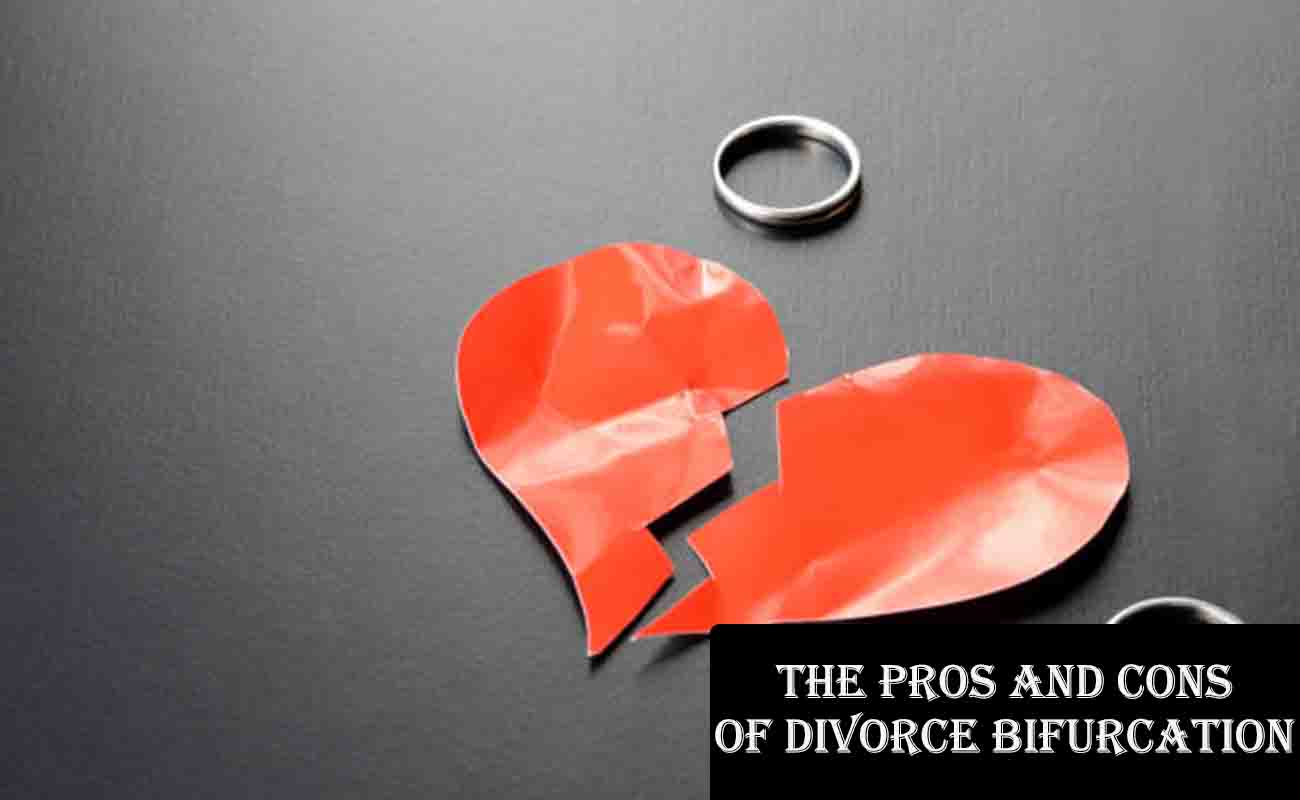This article will bring the the Pros and Cons of Divorce Bifurcation. Divorce is never a simple process, and for many people, it can seem like a confusing legal and emotional maze. The procedure can be emotionally taxing and legally complicated for many couples. Divorce bifurcation is one such tactic to take into account.

By using this legal method, you may break your marriage lawfully while deferring the resolution of other important issues like child custody or property distribution. It’s important to thoroughly analyze the potential benefits and drawbacks of bifurcation. This post will explain divorce bifurcation and assist you in deciding whether it’s the best course of action for your particular circumstance.
I’ve studied the complexities of family law for a long time, and I am aware of how stressful this process may be. I want to simplify things for you so that you can move forward with clarity by helping you understand it.
RECOMMENDED >>> Is Spousal Support Taxed? A Detailed Guide
What is Divorce Bifurcation?
A legal procedure known as “divorce bifurcation” permits the court to split a divorce into two distinct cases. Stated differently, the court has the authority to decide your marital status while delaying decisions on other matters such as spousal support, child custody, or property partition.
Consider the following scenario: you are emotionally prepared to move on, but some legal matters, such as asset division, are taking months to resolve. You can legally end your marriage first with divorce bifurcation, allowing you to go on and resolve any outstanding issues afterward.
Bifurcation isn’t always the best option, so it’s important to consider the advantages and disadvantages before making a decision. Verify the regulations in your jurisdiction because some jurisdictions even have limitations on when and how you can file for bifurcation.
The Pros of Divorce Bifurcation
It’s important to think about how divorce bifurcation can improve your current situation when evaluating the option. Although there are some difficulties with the process, many people discover that the advantages—from practical benefits to emotional relief—make it a wise decision. I’ll go over some of the main reasons why bifurcation could be positive for you below.
1. Emotional Closure and Moving Forward
For a lot of people, divorce is about finding emotional closure rather than only following the law. By formally ending the marriage, bifurcation gives you some closure if you’re mired in an extended lawsuit.
Bifurcation, for example, enables you to end this chapter without waiting for other legal matters to be resolved, whether you’re planning to get married again or just want to move on. You may get back to being single and concentrate on starting the next stage of your life.
2. Tax and Financial Benefits
The financial aspect of bifurcation is one of its practical benefits. You might be eligible to pay taxes as a single person for that year if your divorce is finalized before the end of the calendar year. Sometimes, this can save a lot of money on taxes.
Furthermore, legally dissolving the marriage may result in more precise terms for spousal support payments if you’re requesting it. This approach might sometimes speed up financial relief.
3. Simplifying the Process
It can be exhausting and time-consuming to address every issue at once in a divorce that is very acrimonious. By isolating the urgent necessity to dissolve the marriage from additional problems, this bifurcation facilitates the process. Reducing the scope may make it easier for you and your spouse to deal with the remaining problems in the future.
4. Avoiding Delays from Complex Disputes
Some divorce-related issues, such as allocating business assets or settling child custody disputes, might take months or even years to resolve. Bifurcation offers a means of avoiding being perpetually trapped in legal limbo if delays appear unavoidable.
The Cons of Divorce Bifurcation
Although divorce bifurcation has many benefits, not everyone finds it to be the best option. It has its own set of difficulties and possible drawbacks, just like any other legal tactic, which could make your divorce proceedings more difficult. To make sure you’re choosing the greatest course of action for your situation, it’s important to understand any potential disadvantages before proceeding.
1. Increased Legal Costs
The possibility of higher legal costs is among the biggest drawbacks. In essence, bifurcating a divorce creates two distinct cases: one to dissolve the marriage and another to settle any outstanding disputes. Additional court fees and legal expenses may result from this.
If your finances are already tight, bifurcation could make things worse. It’s important to consider whether, in your particular case, the advantages outweigh the additional costs.
2. Delays in Resolving Key Issues
Bifurcation may hasten the breakup of your marriage, but it may also delay the settlement of other important issues. For instance, if asset division or child custody are handled independently, these processes may take considerably longer to complete.
Bifurcation might not be the best option for you if you’re ready to put an end to everything and move on.
3. Potential for Additional Conflict
Divorce is already a difficult and emotionally taxing process, let’s face it. You run the danger of escalating tensions with your ex-spouse if the proceedings are divided into two sections. The unsolved issues could result in drawn-out disagreements, adding unnecessary frustration to the process as a whole.
4. State Law Restrictions
Divorce bifurcation is not permitted in every state and those that do frequently have restrictions. For instance, you might have to provide a strong justification for the split, such nas eeding to be married again or experiencing financial difficulties.
Pursuing this option may involve additional legal barriers if you reside in a state with strict bifurcation laws, which could outweigh any potential advantages.
Should You Consider Divorce Bifurcation?
When emotions and legal complications are running high, it might be difficult to decide if divorce bifurcation is the best option for you.
Not everyone should make this choice, therefore it’s important to consider your unique situation, priorities, and long-term objectives. You may ascertain whether bifurcation suits your needs by asking relevant inquiries and assessing the most important variables.
- Are you seeking closure and ready to move on emotionally?
- Do you have financial incentives to finalize your divorce quickly?
- Is your divorce likely to involve prolonged disputes over complex issues?
- Are you prepared for the possibility of higher legal costs?
Bifurcation can be a useful strategy for some people to start again and become independent. For others, it might make an already challenging procedure more complicated. You can choose the best course of action for your circumstances by carefully weighing your needs and speaking with an experienced family law lawyer.
How to File for Divorce Bifurcation
Knowing the procedures is essential if you’ve determined that divorce bifurcation is the best course of action for you. Having a clear roadmap will help you navigate the process more successfully, however, it may differ based on the particulars of your case and the rules of your state. An outline of what to expect when submitting a divorce bifurcation petition is provided here.
- Consult an Attorney: The first step is to speak with a family law attorney who understands bifurcation laws in your state. They can guide you through the legal requirements and help you prepare your case.
- File a Motion for Bifurcation: This involves formally asking the court to grant bifurcation and providing justification for it. To make sure this move complies with the laws of your state, your lawyer can assist in its drafting.
- Attend a Hearing: Once your motion is filed, the court will schedule a hearing. Both you and your spouse will have an opportunity to present arguments for or against bifurcation.
- Await the Judge’s Decision: If the judge grants your motion, your marriage will be legally dissolved, and the remaining issues will be addressed separately.
Final Thoughts: Navigating the Pros and Cons of Divorce Bifurcation
Divorce bifurcation is a complex process that has benefits and drawbacks. Although it’s not a one-size-fits-all answer, it can offer the proper person much-needed insight and relief during a trying moment. Spend some time carefully weighing the advantages and disadvantages of this approach, and speak with a reputable lawyer.
I understand how tough these decisions can be because I have experienced the emotional highs and lows of family law battles. Keep in mind that you are not traveling alone. You may move on with assurance and peace of mind if you keep yourself informed and look for the appropriate assistance.
ALSO, READ >>> Best Divorce Lawyers in Houston

